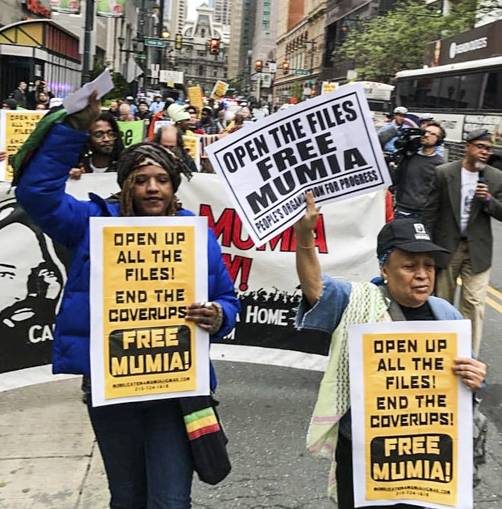Philly elects progressive DA

Philadelphia supporters of Mumia Abu-Jamal march on May 30 to demand district attorney’s office comply with court order in his favor.
By a 3-to-1 margin, Larry Krasner, one of Philadelphia’s most progressive defense attorneys, was elected district attorney on Nov. 7. He defeated Republican nominee Beth Grossman after she was endorsed by the Fraternal Order of Police (FOP).
Unlike Grossman, a career prosecutor, Krasner never served in the DA’s office. In fact, Krasner has sued the Philadelphia Police Department 75 times. He gained his reputation, and his broad community support, by serving as a legal champion of social justice activists.
Krasner has provided counsel and pro bono support to hundreds of activists arrested at AIDS protests, Occupy Philadelphia and Black Lives Matter actions. In 2001, Krasner was one of the progressive lawyers who defended 400 demonstrators arrested en masse at the Republican National Convention. He has successfully defended victims of police brutality as well as demonstrators opposing police brutality.
By way of contrast, Grossman, with over two decades in a department that has become synonymous with corruption, gained notoriety handling civil asset forfeitures, a policy that let the DA’s office seize cash and other property from people even if they had never been convicted of a crime. This questionable practice has come under considerable fire.
Nonetheless, the Philadelphia ruling class’s major media mouthpiece, the Philadelphia Inquirer, chose to endorse Grossman. That was a surprising move, going against their long-standing tradition of endorsing Democratic candidates in a city where registered Democrats outnumber Republicans 7 to 1.
Many other upset victories occurred across the U.S. in this off-year election in which Democrats defeated Republican candidates. Krasner, however, while running as the Democratic Party nominee, was hardly that party’s first choice. In this year’s primary elections, Krasner gained ballot access after easily defeating six other Democratic Party contenders, many with prosecutorial credentials. He had an 18-point lead over his closest rival.
That primary victory took place in the midst of one of the biggest scandals in the history of the Philadelphia DA’s office. Former DA Seth Williams, convicted on a number of corruption charges, was forced to resign and in October was sentenced to five years in prison.
Krasner campaigned on a platform that included working to end mass incarceration, stopping cash bail imprisonmen, decriminalizing addiction, stopping pursuit of death sentences, ending illegal stop-and-frisk. and halting civil asset forfeiture abuse.
Holding his feet to the fire
He spoke out against the Trump administration’s attacks on immigrants and also promised to stand up to police misconduct.
While Krasner’s election victory was significant, more important than his campaign promises is the potential of the movement behind his successful challenge to FOP opposition. Many participants in this effort were themselves former prisoners, drawn in by Krasner’s stand against mass incarceration.
Two days after Krasner’s electoral victory, the 20-group Philly Coalition for a Just DA held a demonstration and press conference outside the DA’s office to present their vision of transformative policies for the first 100 days after Krasner assumes office in January.
According to their press release, the coalition “includes people directly impacted by mass incarceration; groups working on prison abolition, survivor’s rights, immigrant rights and civil rights.” (Their detailed platform is at phillydaforthepeople.org/#facts.)
Erika Almiron, executive director of the immigrant rights group Juntos and a coalition member, stated that Larry Krasner’s victory “shows that the citizens of Philadelphia choose to stand on the side of justice and are hungry for a massive revamping of our criminal justice system from one that actively punishes our community’s mere existence to one that centers on family reunification and the decriminalization of Black, Brown and undocumented bodies.”
Huge questions remain about Krasner’s ability to fulfill his supporters’ demands. One of his campaign platform promises was to “review past convictions” and to “free wrongfully convicted” prisoners. But how far will that go?
The MOVE 9 were unlawfully convicted in 1978 for defending their organization against police attacks. Political prisoner Mumia Abu-Jamal was wrongfully convicted in 1982 for the “crime” of speaking out against rampant police brutality under the Frank Rizzo regime. Their supporters plan to seek DA Krasner’s review of these cases.
It remains to be seen if they can gain an audience. Abu-Jamal currently has an active legal appeal against the Philadelphia DA’s office, seeking the release of documents related to former DA Ron Castille’s involvement in his conviction.
No good cops in a racist system
While groups that supported Krasner are speaking out in support of his platform, police in Philadelphia have been using social media to attack, threaten and denigrate him. One video post, which appears to have been made inside a police facility, showed a close-up of a notoriously violent officer prank-calling and threatening the law firm where Krasner works, which had no connection with his election campaign.
The organized racist police opposition during the election and their ongoing attacks on Krasner and the social justice platform he campaigned on demonstrate why an electoral victory by itself is not enough. It will take more than one progressive lawyer to fundamentally change the nature of the office of the Philadelphia DA, which is part and parcel of the oppressive capitalist state apparatus.
Krasner has stated that he can work with “good officers of the PPD,” who, he believes, are “the overwhelming majority.” This is in strong contrast to Black activists who call for abolition of the police. One slogan of the anti-police brutality organization REAL Justice is “No good cops in a racist system.”
It took a collective, mass people’s movement to win this election for Krasner. It will take a continued movement, led by the most oppressed communities, to push forward the reforms they need. These communities are fighting against an establishment that wields formidable powers. Winning these reforms will certainly prove more difficult than the election itself.
It will require a united peoples’ movement pushing back against the establishment, including the FOP, to fulfill the promise of this campaign.

